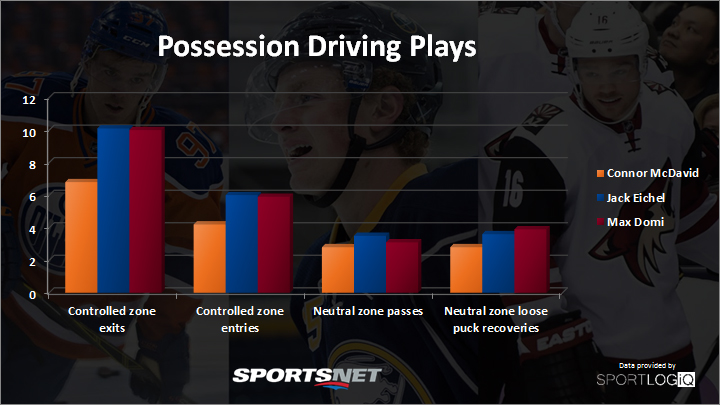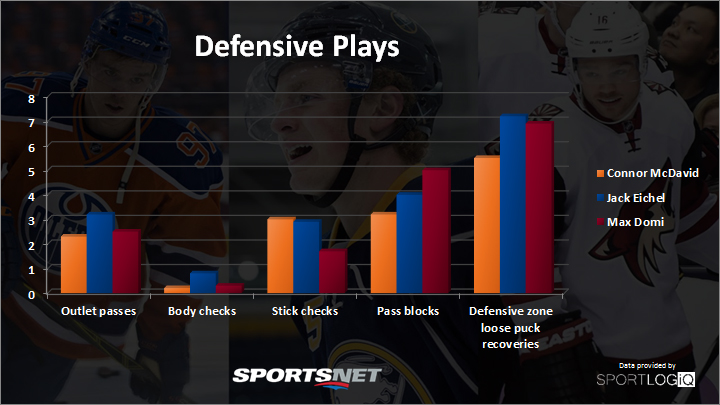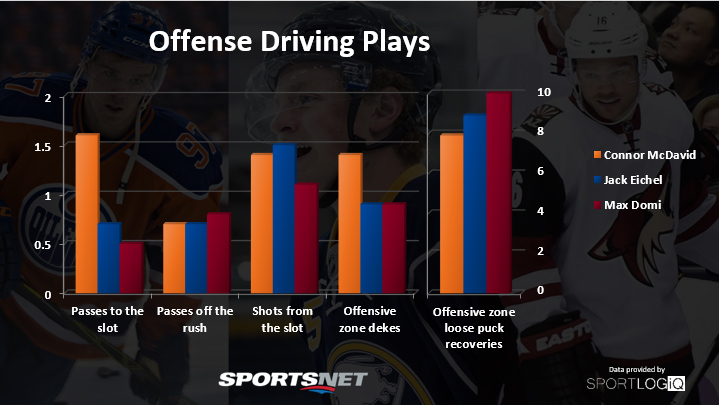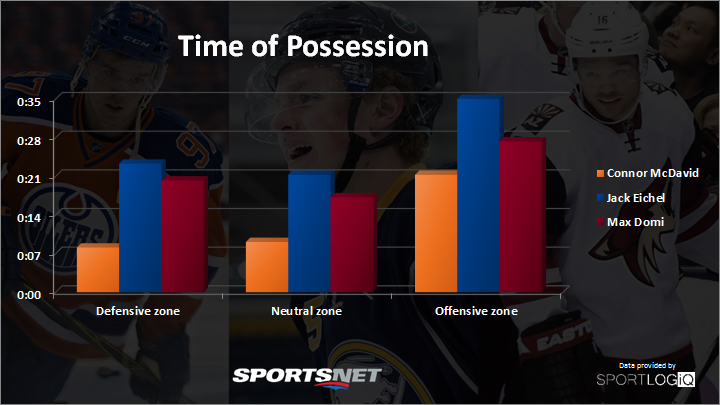ANDREW BERKSHIRE: Sportsnet
For the first time since 2005, the NHL has welcomed two rookies with possibly generational talent in Connor McDavid and Jack Eichel, but another rookie has been stealing headlines early in the season.
Max Domi has been a revelation in Arizona, teaming up with former Canadian World Juniors teammate Anthony Duclair to create a potent offense on a team that was expected to be in the NHL’s basement.
Domi has the advantage of being older than McDavid and Eichel, which is a major factor at this early stage in all their careers. Teenagers rarely flourish in the NHL, which only makes it more impressive when those who make it truly impress. Something to remember is that Eichel is also older than McDavid, and while it’s only by a few months, at this young of an age that can be a factor.
About an eighth of the way into the season, point production does tell us a bit about how a player is performing, but not a lot. Both McDavid and Domi are clicking at point per game paces so far, while Eichel is stuck at just four goals and zero assists. That doesn’t mean Eichel has been less valuable to his team though.
In order to evaluate and compare these three players more comprehensively, we’ll look at a combination of analytics for three distinct areas of the game; driving possession up the ice and through the neutral zone, defensive plays to get the puck back from opponents, and offense creation. As a bonus, we’ll look at how often each player has the puck, and what that tells us.
All statistics are even strength only, and pro-rated for every 20 minutes of even strength ice time. Only successful plays are counted.

In terms of driving possession individually, it’s clear that McDavid is lagging behind the others. Part of that is the different systems on each team, as Buffalo dumps the puck out and in less than the Oilers do, but Arizona is guilty of dumping the puck even more than Edmonton, which shows how much of an impact Domi’s skating and passing ability has there.
System differences aside, Eichel deserves a lot of credit for his confidence with the puck, as he’s not at all hesitant to carry it and make plays, a rare quality for a 19-year-old.
Eichel and Domi also outpace McDavid in loose puck recoveries in the neutral zone, which can be anything from intercepting a pass to collecting a puck after a teammate lays a hit. It may not seem like much, but that establishing of possession is a huge part of the game. For example, anyone who likes to focus on faceoffs, every loose puck recovery is the equivalent to a faceoff, but during play.

When it comes to defensive play, McDavid is once again bringing up the rear overall, but he does lead by a hair when it comes to stick checking. None of these players are especially physical, though of the three, Eichel is clearly the leader there. Note that when Sportlogiq talks about successful body checks, it means the player being checked was separated from the puck. Players are not given credit just for finishing a check, so these kinds of body checks directly impact puck possession.
Eichel also leads the way in both loose puck recoveries, and outlet passes, showing why many pundits have praised his defensive ability early on. Getting to those loose pucks and sending the puck to a teammate up the ice are two of the most important plays you can make on the defensive side of the puck.
Meanwhile, Domi is the most disruptive of the three, blocking more passes than most veteran forwards and breaking up plays before they can happen.

Now, when the play moves into the offensive zone, that’s when it’s McDavid’s chance to shine. Eichel and Domi are still ahead of McDavid when it comes to recovering loose pucks, but he blows the competition out of the water when it comes to successful passes to the slot. Domi leads by a hair in passes off the rush, but the three are roughly equivalent there.
Where Eichel leads is shooting from the slot, but for his wide advantage in number of total shots on goal over McDavid so far, he hasn’t been shooting from the slot that much more often.
Then there are dekes in the offensive zone, which anyone who has watched McDavid would know he’s excellent at. In fact, only six forwards in the NHL have executed more successful dekes in the offensive zone than McDavid. Using a combination of his hands and his crazy acceleration, McDavid is able to create high-end chances out of seemingly nothing, often against the NHL’s best defenders.
Also notice the numbers on the y-axis for these offensive plays are remarkably small. The kinds of plays that break open games are naturally rare, and hence, significantly more valuable. None of these guys are slouches offensively, but McDavid is clearly ahead of the pack when it comes to creating scoring opportunities.

Adding another wrinkle, we can look at how long each player has possessed the puck per 20 minutes of ice time in each zone. Once again McDavid is significantly behind the others, with Eichel carrying the puck significantly more than anyone else.
This may show McDavid’s youth a little bit, as well as Eichel’s relative maturity, especially physically. Having the puck more often is a positive in most respects, but one thing that sticks out to me about McDavid having the puck less than both his contemporaries, is how much more he’s doing with it while he has it in the offensive zone.
McDavid may be behind the other two rookie standouts in terms of his all-around game, but he has a special something offensively that’s so rare. Whether that makes up for being behind in other areas is up for interpretation, but as he gets older he is more likely to catch up defensively than he is to fall off offensively.